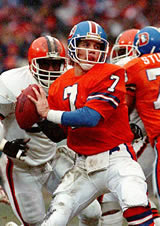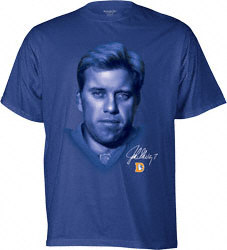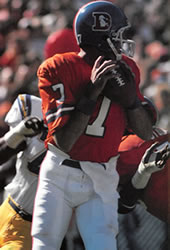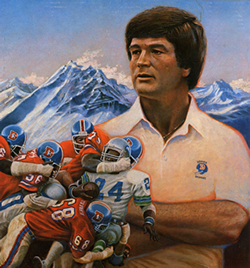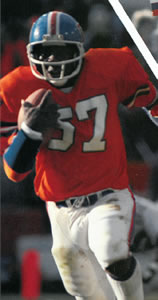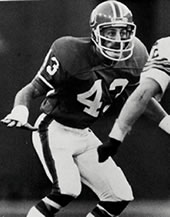 KNOW YOUR 1980s DENVER BRONCOS
KNOW YOUR 1980s DENVER BRONCOS
This week, for the final installment ever of KY1980sDBs, #7, the quintessential 1980s Denver Bronco, John Elway.
Remaining editions of KY1980sDBs: 0! By now, I have probably driven off all readers of this blog, if there were any to begin with. But you can come back now. I won’t be writing any more of these things.
After a standout college career at Stanford, which I do not hold against him, John was highly sought-after as both a professional football and baseball player. The Baltimore Colts had the first overall pick in the 1983 draft and wanted to take John, but he famously refused to play for them, stating that if they drafted him he would play baseball instead. The Colts relented and traded him to the Broncos, where Elway would spend his entire 16-year pro career. John went on to become one of the greatest players in not only Broncos history, but NFL history. He combined a legendary strong arm with fantastic mobility, and had an uncanny ability to force good things to happen for his team, winning dozens of games on fourth-quarter comebacks. He is inarguably the greatest Bronco player ever, leading the team to 148-82-1 record, multiple division titles, and five Super Bowls (an NFL record), and two titles. John holds a very prominent place on all-time NFL leaderboards as well. He is fourth all-time in career passing yards and completions, fifth in touchdowns, and second in wins as a starting quarterback. He is sixth all-time in rushing yards gained as a quarterback. He is also the all-time leader in getting sacked, no doubt thanks to Denver’s often sketchy offensive lines and his insistence on waiting as long as possible to make the best play. He was named league MVP in 1987. John was enshrined in the Broncos’ Ring of Fame in 1999, the College Football Hall of Fame in 2000, and the NFL Hall of Fame in 2004 (the first player to be inducted as a Bronco).
He played in Super Bowl XXI, in which the Broncos were pummeled by the New York Giants 39-20, Super Bowl XXII, in which the Broncos were pummeled by the Washington Native Americans 42-10, and Super Bowl XXIV, in which the Broncos were pummeled by the San Francisco 49ers 55-10. This pretty much cemented John’s and the Broncos’ reputation as big-game punching bags. They finally redeemed themselves when John and game MVP Terrell Davis led the Broncos to glorious victory over the Packers in Super Bowl XXXII, 31-24. The following year, the team went 14-2 (starting the season 13-0) and cruised to a second title over the Atlanta Falcons, 34-19, in Super Bowl XXXIII. John was named Super Bowl MVP and retired in the offseason, his work as an NFL legend completed.
So what makes John Elway so awesome? Wow, where to begin? John spent most of his youth in my favorite town in the world, Missoula, Montana. He was a Sunday staple, providing me and all Broncos fans hope that we could win every week for 16 years. The Drive. We suffered with him through painful Super Bowl losses, the Dan Reeves and Wade Phillips eras. We triumphed with him on January 25, 1998, when a Super Bowl finally came to Denver. He is in any conversation about the greatest quarterbacks of all time. He reportedly sent a free designer recliner to a student who was teased for wearing a Broncos’ jersey. John Elway isn’t my all-time favorite Denver Bronco, but he’s near the top and is probably the reason I grew up to write 22 editions of KNOW YOUR 1980s DENVER BRONCOS.
Since retirement from football, John has participated in a number of Colorado business ventures including car dealerships, appearances in video games and other commercials and sponsorship deals, and ownership of an Arena League football team. These have all no doubt made him much more filthy rich than he was as just a football player. He has recently married an ex-Raiders cheerleader and gives money to Colorado Republicans, both of which make me sad. Of course, both of these acts are in his personal best interest (one for love, one to benefit rich guys), so why shouldn’t he?
